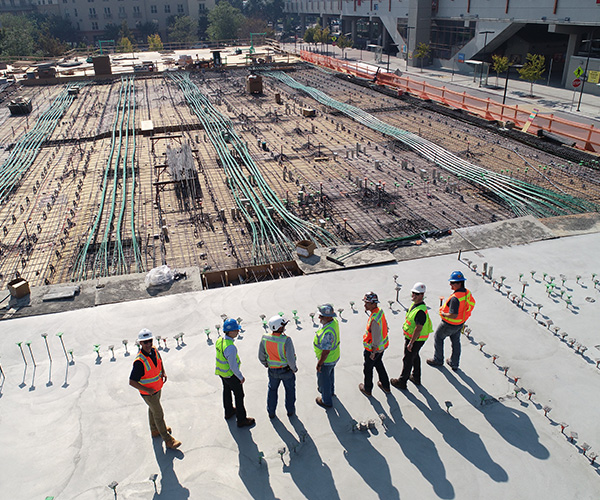Building Bridges: Careers in Civil Engineering and Infrastructure Construction
WEBUILD STAFFING BLOG |
Building Bridges: Careers in Civil Engineering and Infrastructure Construction

Civil engineering and infrastructure construction are integral components of modern society, shaping the built environment and facilitating economic development. From bridges and highways to water treatment plants and airports, civil engineers play a critical role in designing, constructing, and maintaining the infrastructure that supports our communities. Lets explore the diverse and rewarding careers available in civil engineering and infrastructure construction, highlighting the education, skills, and opportunities that these fields offer to aspiring professionals.
-
The Role of Civil Engineers:
Civil engineers are responsible for designing, planning, and overseeing the construction of infrastructure projects that meet the needs of society while ensuring safety, sustainability, and efficiency. Civil engineering encompasses a broad range of disciplines, including structural engineering, transportation engineering, geotechnical engineering, and environmental engineering. Civil engineers work on projects such as roads, bridges, tunnels, dams, airports, and water supply systems, applying their technical expertise and problem-solving skills to address complex engineering challenges.
-
Career Paths in Civil Engineering:
Civil engineering offers a wide array of career paths and specialties, allowing professionals to specialize in areas that align with their interests and strengths. Some of the key career paths in civil engineering include:
-
Structural Engineer: Structural engineers design and analyze the structural systems of buildings, bridges, and other infrastructure projects to ensure they can withstand the forces of nature and meet safety standards.
-
Transportation Engineer: Transportation engineers focus on planning, designing, and managing transportation systems, including roads, highways, railways, and airports, to optimize traffic flow and improve safety and efficiency.
-
Geotechnical Engineer: Geotechnical engineers study the behavior of soil and rock formations to assess their suitability for construction projects and mitigate risks such as landslides, foundation failures, and soil erosion.
-
Environmental Engineer: Environmental engineers work to protect and preserve the natural environment by designing and implementing solutions for pollution control, water and wastewater treatment, and sustainable resource management.
-
Education and Skills:
A career in civil engineering typically requires a bachelor’s degree in civil engineering or a related field from an accredited university. Advanced degrees, such as a master’s or doctoral degree, may be required for certain specialized roles or research positions. In addition to formal education, civil engineers must possess a range of technical, analytical, and interpersonal skills, including:
-
Technical Proficiency: Civil engineers must have a solid understanding of engineering principles, mathematics, and scientific principles, as well as proficiency in engineering software and design tools.
-
Problem-Solving Skills: Civil engineers must be able to analyze complex problems, identify potential solutions, and evaluate their feasibility and effectiveness.
-
Communication and Collaboration: Civil engineers work closely with other professionals, including architects, contractors, and government officials, and must be able to communicate effectively and collaborate with diverse stakeholders.
-
Project Management: Civil engineers must possess strong project management skills, including the ability to develop project plans, manage budgets and schedules, and oversee the work of multidisciplinary teams.
-
Opportunities in Infrastructure Construction:
Infrastructure construction offers a wide range of career opportunities for civil engineers and construction professionals. Infrastructure projects are essential for maintaining and improving the built environment, enhancing quality of life, and stimulating economic growth. Some of the key areas of infrastructure construction include:
-
Transportation Infrastructure: Transportation infrastructure projects include roads, bridges, railways, airports, and transit systems, which are critical for facilitating the movement of people and goods and supporting economic activity.
-
Water and Wastewater Infrastructure: Water and wastewater infrastructure projects include water treatment plants, sewage treatment facilities, and pipelines, which are essential for providing clean drinking water and protecting public health.
-
Energy Infrastructure: Energy infrastructure projects include power plants, transmission lines, and renewable energy facilities, which are vital for meeting the energy needs of society and transitioning to a more sustainable energy future.
-
Public Works Infrastructure: Public works infrastructure projects include parks, schools, government buildings, and community facilities, which contribute to the well-being and livability of communities.
-
Emerging Trends and Technologies in Civil Engineering:
The field of civil engineering and infrastructure construction is constantly evolving, driven by advancements in technology, changes in demographics, and shifts in societal priorities. Some of the emerging trends and technologies shaping the future of civil engineering and infrastructure construction include:
-
Sustainable Design and Construction: Sustainable design principles, such as green building practices, energy efficiency, and renewable energy integration, are increasingly being incorporated into civil engineering and infrastructure construction projects to minimize environmental impact and enhance resilience.
-
Digital Twin Technology: Digital twin technology allows civil engineers to create virtual replicas of physical assets, such as buildings, bridges, and infrastructure systems, to monitor performance, optimize operations, and facilitate predictive maintenance.
-
Building Information Modeling (BIM): Building Information Modeling (BIM) software enables civil engineers to create detailed 3D models of construction projects, improving collaboration, coordination, and decision-making throughout the project lifecycle.
-
Autonomous Construction Equipment: Autonomous construction equipment, such as drones, robotic vehicles, and 3D printers, are revolutionizing construction processes, increasing productivity, and improving safety on job sites.
Civil engineering and infrastructure construction offer diverse and rewarding career opportunities for individuals interested in shaping the built environment and making a positive impact on society. Whether you’re passionate about designing innovative structures, improving transportation systems, or enhancing environmental sustainability, a career in civil engineering and infrastructure construction allows you to apply your skills and expertise to tackle some of the world’s most pressing challenges. By pursuing education, gaining experience, and staying abreast of emerging trends and technologies, aspiring civil engineers and construction professionals can build successful and fulfilling careers in this dynamic and vital field.
Webuild Staffing Agency is a leading executive search and staffing agency dedicated to the construction, engineering and environmental industries. To learn more please visit: www.webuildstaffing.com










